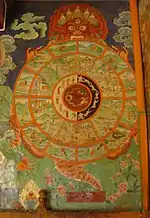
Tibetan Bhavacakra or "Wheel of Life" in Sera, Lhasa.
In the Buddhist tradition, karma refers to intentional (cetanā) action. Those intentions are considered to be the determining factor in samsara, the cycle of rebirth.
Quotes
- Karma is a being’s intentional ‘actions’ of body, speech, and mind—whatever is done, said, or even just thought with definite intention or volition.
- Rupert Gethin, The Foundations of Buddhism, Oxford University Press. Kindle Edition, 1998, p. 119.
- At root karma or ‘action’ is considered a mental act or intention; it is an aspect of our mental life: ‘It is “intention” that I call karma; having formed the intention, one performs acts (karma) by body, speech and mind.’
- Rupert Gethin, The Foundations of Buddhism, Oxford University Press. Kindle Edition, 1998, p. 119.
See also
External links
This article is issued from Wikiquote. The text is licensed under Creative Commons - Attribution - Sharealike. Additional terms may apply for the media files.